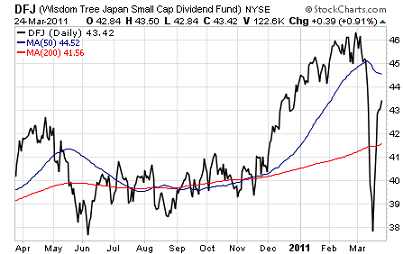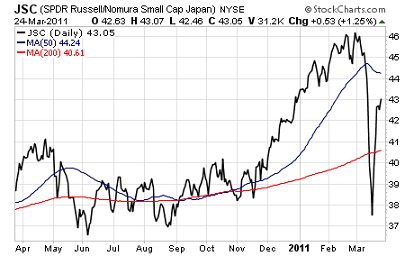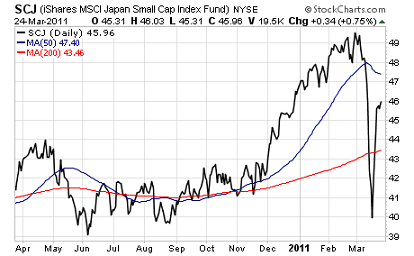Warren Buffett calls the crisis in Japan, “a
buying opportunity”.
Buffet recently proclaimed in the Financial
Times that, "Frequently
something out of the blue like this, an extraordinary event, really
creates a buying opportunity. I've seen that happen in the United States,
I've seen that happen around the world, and I don't think Japan will be
an exception."
Jim Rogers agrees.
In an interview with the Economic
Times the commodity investing guru
stated: "Normally whenever there is an artificial event like this, it
is a terrible tragedy, but also buying opportunity because we assume we
are not going to have gigantic earthquakes every year. So it is normally
a buying opportunity. It is a question of when you step in to
buy."
I'm tossing my hat in the ring alongside these
investing greats - I believe investors who buy Japanese stocks now will
be happy they did so in two years. Not just because stocks retreated so
far so fast, but because Japan was an attractive investment
before the earthquake.
***The recent collapse in the Japanese stock market has been one of the
most rapid in history, even compared to the market crashes of 1929 and
1987.
Japan's stock market, better known as the Nikkei,
fell over twenty percent last week. The steep decline occurred
while authorities dealt with the aftermath of the tragic events off the
coast of northeast Japan.
The Nikkei could just be the most intimidating
market in the world right now as radiation concerns make an already
complex rebuilding effort that much more complicated.
As I stated last week, the fear is
palpable. I was speaking about the
uranium markets at that point, but the same fear that gripped those
markets last week is strangling Japanese stocks today. Uranium stocks
already bounced over 30% since my recommendation to pick up
Denison Mines DNN. I think you'll see similar
gains, albeit over a longer time frame, if you pick up the right Japanese
small cap investments today.
Successful investors understand the basic push and
pull that makes markets function properly. They realize the market is
filled with millions of investors who have hopes & fears - both
rational and irrational.
Money, and expectations of making or losing it,
has a way of driving an otherwise rational investor to irrational
behavior. When this happens on a large scale, like when investors
recently dumped Japanese stocks, herd mentality is perpetuated and
psychological impulses take over.
At this point, and usually over a short time
frame, fundamentals don't move stocks - rather stocks move based on
investors' hopes, expectations and in this case, fears.
Fear is the one single emotion that can be preyed
upon successfully by the informed investor time and time again. That's
why Buffett and Rogers are so successful - they, like many great
investors, are the rational buyers snatching up shares from irrational
sellers.
There are a number of ways investors can gain
access to Japanese small cap stocks. Undoubtedly, the easiest and lowest
risk option (also the most cost effective) is through Exchange Traded
Funds (ETFs).
The three I have chosen are more “pure plays” on the local Japanese economies that reflect domestic consumption. This is of important strategic significance for investors adding exposure to Japan's small cap asset class. These stocks will react more to domestic consumption patterns than will larger cap stocks in Japan. The way to play the latter through ETFs is to buy the iShares MSCI Japan Index Fund EWJ - but that's not our move here. We're interested in the faster moving small caps.
The largest of the three ETFs, with $142.9 million
in net assets, is the WisdomTree Japan Small Cap Dividend Fund
DFJ. This ETF has the bulk of its holdings in consumer
cyclicals, industrials and basic materials. It has an expense ratio of
0.58 percent and a yield of 1.6 percent. The ETF has respectable returns
of 18.6 percent over the past year.

The second fund, the SPDR Russell/Nomura
Small Cap Japan ETF JSC, is also weighted toward
consumer cyclical, industrials, basic materials and technology. It
has a slightly lower expense ratio of 0.56 percent and a slightly lower
yield of 1.54 percent as compared to the DFJ. The JSC also posted a
nice gain of 21.8 percent over the past year.

Like the DFJ and the JSC, the iShares MSCI Japan Small Cap Index SCJ has exposure to consumer cyclicals, industrials, basic materials and technology. It is the smallest of the three small cap ETFs with net assets of $39.2 million. The ETF has an expense ratio of 0.53 percent and yields 1.83 percent. The SCJ has posted the largest gain (albeit by a small margin) of the three with a 22.2 percent rise over the past year.
Of these three Japanese small cap ETFs, my
favorite is the SCJ. This ETF tracks the MSCI Japan Small Cap index,
targeting 40% of the eligible small cap companies within each industry
group. The SCJ also edges out JSC and DFJ in performance over the last
five years, and it has the lowest expense ratio.
Headlines will continue to drive the Japanese
markets over the near-term as the nation lays out a plan for recovery and
takes the appropriate actions. Although the earthquake, tsunami and
ensuing radiation concerns will continue to present challenges for Japan,
the extreme sell-off in small cap stocks in the country is indeed a
“buying opportunity”.
Any of the three ETFs discussed here will give you
exposure to the bullish trend that the Japanese market has experienced
over the past two years, and which should continue in spite of the
destruction. The fact remains that the earthquake and tsunami lowered
valuations to levels not seen for over 35 years.
That's just too compelling an opportunity for small cap value investors to pass up.
© 2025 Benzinga.com. Benzinga does not provide investment advice. All rights reserved.
Trade confidently with insights and alerts from analyst ratings, free reports and breaking news that affects the stocks you care about.
